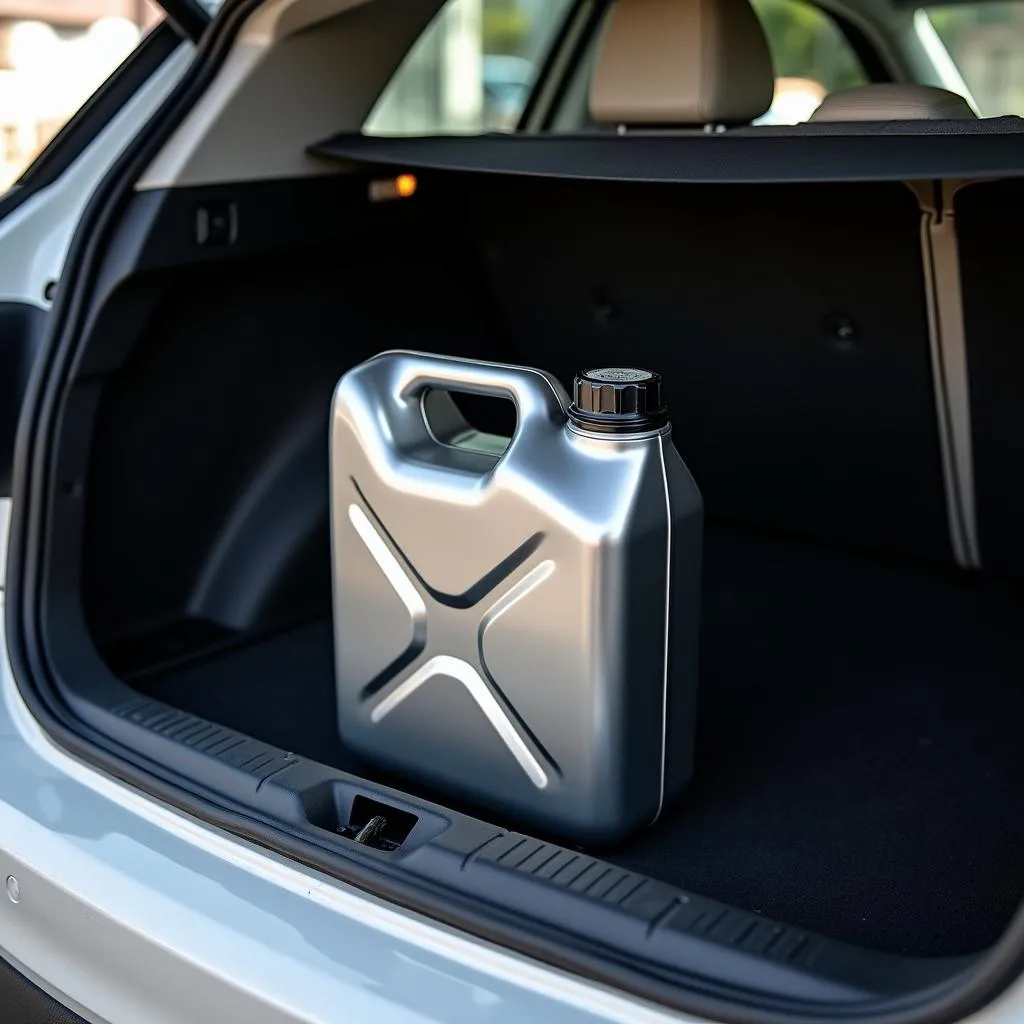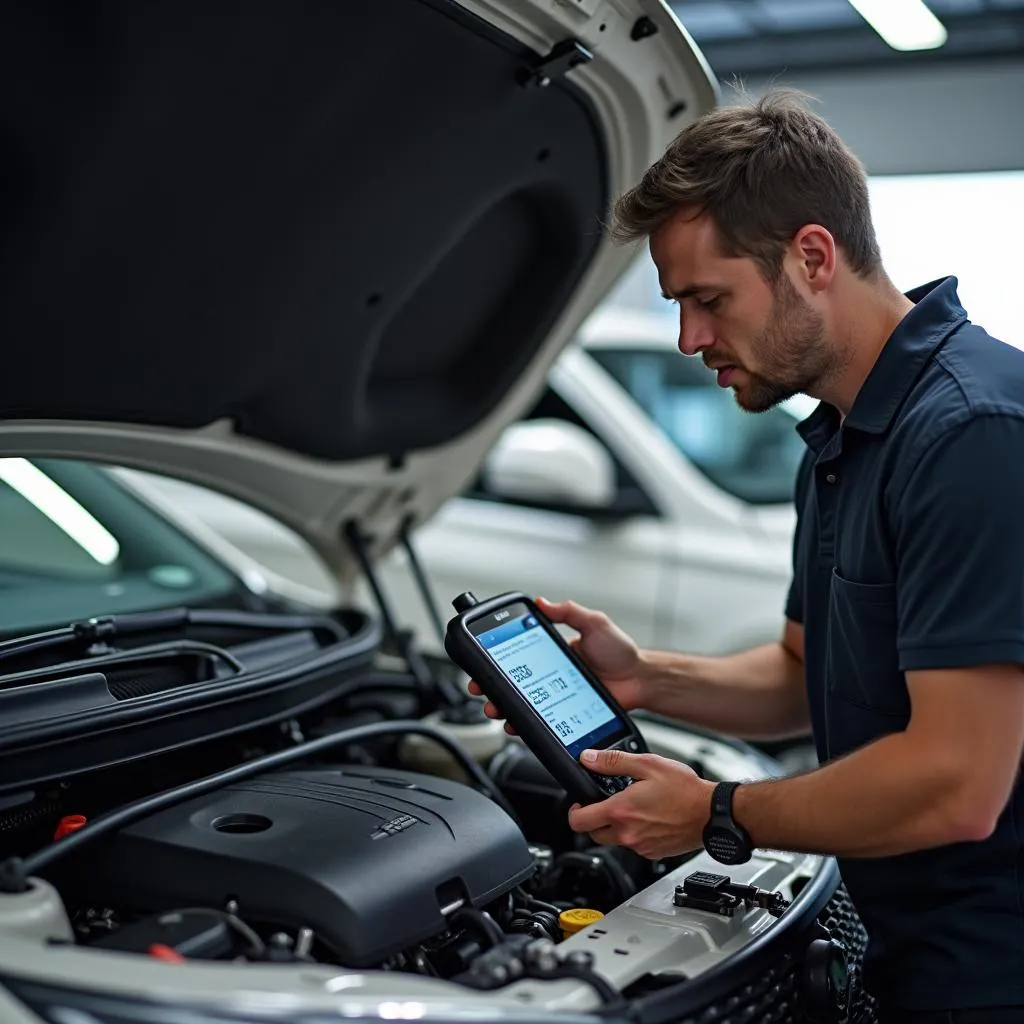Everyone knows the situation: gas prices are rising again, and you think twice about whether you really need to fill up. The idea of a reserve gas canister in the car seems appealing. But is it even allowed? And if so, what do you need to pay attention to? In this article, we clarify all the important questions surrounding the topic of “storing gas canisters in your car.”
Is it Permitted to Transport a Gas Canister in Your Car?
The good news: Yes, it is generally permitted to transport a gas canister in your car. However, there are some important rules and regulations to consider. Gasoline is highly flammable and poses a significant risk.
 Gas canister in a car trunk
Gas canister in a car trunk
What Regulations Apply to Storing Gas Canisters in a Car?
The most important rules for transporting gasoline in a car are laid down in the Ordinance on Hazardous Goods Transport by Road, Rail and Inland Waterways (GGVSEB). Here are some points you should consider:
- Approved Canister: Only use canisters specifically approved for gasoline. You can recognize these by the marking and the test seal.
- Maximum Filling Quantity: The permitted filling quantity per canister is limited. Generally, you may transport a maximum of 10 liters of gasoline in a canister.
- Secure Fastening: The canister must be securely stowed in the vehicle so that it cannot be thrown around in the event of an accident or emergency braking. The trunk is best suited for this. Additionally, secure the canister with tension belts or in a transport box.
- Ventilation: Ensure adequate ventilation in the vehicle to avoid a dangerous concentration of gasoline vapors. Never transport the canister in the passenger compartment.
- Behavior in an Emergency: Know how to behave in the event of an accident or leak.
What Risks are Involved in Storing Gasoline in a Car?
Improper storage of gasoline in a car carries some risks:
- Fire Hazard: Gasoline is highly flammable and can ignite even with slight exposure to heat.
- Explosion Hazard: Gasoline vapors can mix with air to form an explosive mixture.
- Health Hazard: Gasoline vapors are harmful to health and can lead to headaches, nausea, and respiratory problems.
Tips for Safely Transporting Gasoline in Your Car
In addition to the legal regulations, there are a few tips you should follow for safely transporting gasoline in your car:
- Check Regularly: Regularly check the canister and the closure for leaks and damage.
- Store Cool and Dry: Store the canister in a cool, dry, and well-ventilated place. Avoid direct sunlight and heat.
- No Smoking: Never smoke near the canister or while transporting gasoline.
- Caution When Handling: Be careful when filling and emptying the canister and avoid spilling gasoline.
- Storage: Do not store the canister permanently in the car. Only fill the canister when needed and use the gasoline promptly.
 Mechanic inspecting a car
Mechanic inspecting a car
Conclusion: Storing Gas Canisters in Your Car – With Caution and Common Sense
Basically, it is permitted to transport a gas canister in your car. However, you must strictly observe the legal regulations and safety instructions to avoid risks. A reserve canister in the car can be helpful in emergencies, but should never be used for permanent storage of gasoline.
Frequently Asked Questions About “Storing Gas Canisters in Your Car”
- How long can you store gasoline in a car? There is no legal storage period for gasoline in a car. However, it is recommended to use the gasoline as soon as possible, as the quality may decrease over time.
- Which canister is suitable for gasoline in a car? Only use canisters specifically approved for gasoline. You can recognize these by the marking and the test seal.
- How much is the fine if you transport gasoline incorrectly? The amount of the fine depends on the severity of the offense. Improper storage of gasoline in a car can result in fines of up to 500 euros.
More Interesting Topics About Cars and Mobility
Do you need more information on the topic of “storing gas canisters in your car” or do you have questions about other areas of car repair? Then do not hesitate to contact us. Our experts are at your side with advice and assistance.

